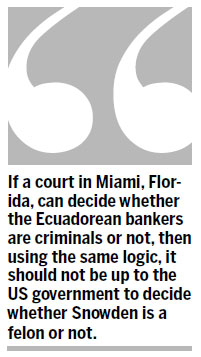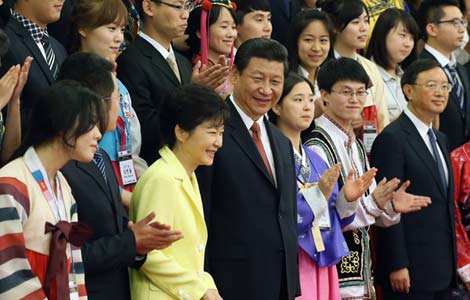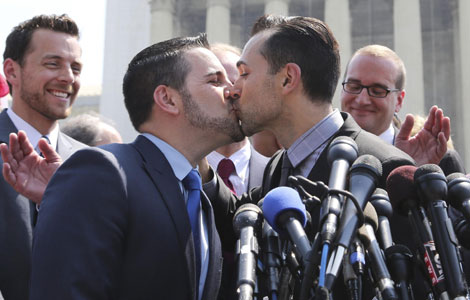Dodging key question on Snowden's revelations
Updated: 2013-06-28 08:07
By Chen Weihua (China Daily)
|
||||||||

Yahoo News has done an interesting analysis of the 444 briefings through June 18 by White House Press Secretary Jay Carney and found 13 distinct ways in which he dodges reporters' questions.
For example, he replied with "I don't have the answer" 1,905 times; "I would refer you to someone else" 1,383 times; "You already know the answer" 1,125 times and "I am not going to tell you" 939 times.
Carney, a former Washington bureau chief for Time magazine, may be an expert in evading the media's pursuit of answers. But I assume all government spokespersons do that to a greater or lesser extent. Carney and many US officials have been extremely skillful in dodging questions on the Edward Snowden case and misdirecting public attention.
Instead of addressing the international concern over its global surveillance program conducted by the US National Security Agency, the US has continued to divert attention from its actions by describing the NSA contractor first as a traitor who leaks information that aids terrorists and now as a felon who stole classified government information.
When the Chinese government requested the Obama administration explain the aggressive hacking into Chinese cellphone companies to access the text messages of millions of citizens and the attack on the networks at Tsinghua University and computers at the Hong Kong headquarters of telecom service provider Pacnet, the US again avoided the issue, accusing China of failing to arrest Snowden instead.
US officials, including Carney, have claimed that not detaining Snowden in the Hong Kong Special Administrative Region will have a negative impact on the bilateral relationship, conveniently masking the fact that it is the US' massive hacking of China that has cast a shadow over relations.
On Wednesday, US Defense Secretary Chuck Hagel also expressed his disappointment at the Chinese government. He too failed to mention how more disappointed China should be at the NSA aggression.
Dodging the essence of the Snowden case again, Carney and other US officials then started to argue that Snowden has chosen unlikely protectors "if his passion here is for press freedom and freedom of the Internet".
To me, the answer is quite simple, and I am not going to dodge it: Only few countries dare to stand up to the sole superpower given its willingness to coerce others to get its way.
After sensing unwillingness by the Russian President Vladimir Putin to hand over Snowden to the US, Secretary of State John Kerry quickly called Russia a "repressive country".
US officials and lawmakers have also heaped blames on Ecuador, which is considering Snowden's request for asylum. The chairman of the US Senate Foreign Relations Committee, Robert Menendez, has proposed punishing Ecuador economically if it offers him asylum. US officials also dodged Ecuadorean Foreign Minister Ricardo Patino's question why the US has refused to extradite several convicted Ecuadorean bankers wanted by his government.
If a court in Miami, Florida, can decide whether the Ecuadorean bankers are criminals or not, then using the same logic, it should not be up to the US government to decide whether Snowden is a felon or not. In most parts of the world, the 30-year-old is regarded as a hero, not a criminal.
The US has launched a vicious and unfounded publicity campaign over the past year accusing China of cyber espionage, a charge that most countries, certainly China, can legitimately make against the US.
Speaking at the Center for Strategic and International Studies on Wednesday, Barton Gellman, whom Snowden contacted at the Washington Post to publicize his disclosures, repeatedly reminded the audience that the essence of the Snowden case is his revelations, not anything else. That was also the constant message of Glenn Greenwald, the Guardian reporter who has been covering Snowden's case from the very beginning.
I don't know how many times the US has tried so far to dodge the fundamental question about Snowden's revelations. It certainly has appeared resourceful and relentless.
But it is time to answer the question, please!
The author, based in Washington, is deputy editor of China Daily USA. E-mail: chenweihua@chinadailyusa.com
(China Daily USA 06/28/2013 page15)

 NASA telescope to probe solar mystery
NASA telescope to probe solar mystery
 Visit aids 'trust-building process'
Visit aids 'trust-building process'
 King of Pop returns
King of Pop returns
 Crowds cheer Court decision on gay marriage
Crowds cheer Court decision on gay marriage
 Hiring index signals further job weakness
Hiring index signals further job weakness
 Dance becomes popular stress relief
Dance becomes popular stress relief
 Philippine, US start Naval exercise in S China Sea
Philippine, US start Naval exercise in S China Sea
 Supreme Court gay rights ruling celebrated across US
Supreme Court gay rights ruling celebrated across US
Most Viewed
Editor's Picks

|

|

|

|

|

|
Today's Top News
Senate OKs immigration reform; hurdles remain
Snowden could request asylum in Russia: official
US collects Internet data on citizens
Boston bombing suspect accused in 4 deaths
816 elected in provincial leadership reshuffle
US adds to DPRK sanctions list
Chinese pros put trust in blogs
More Americans see Snowden as patriot: Poll
US Weekly

|

|






